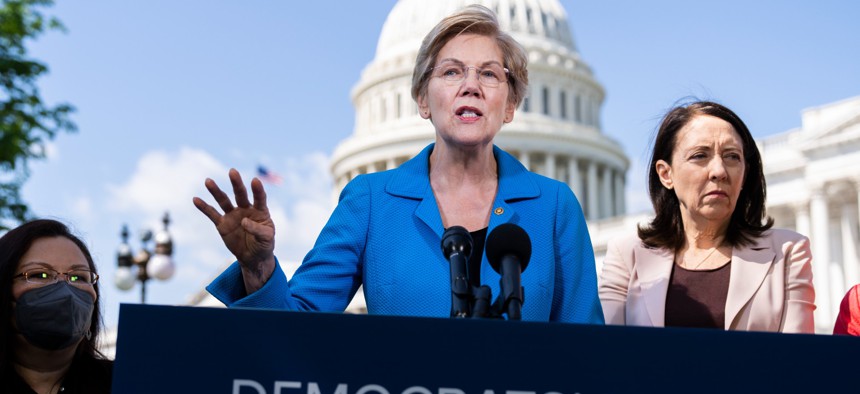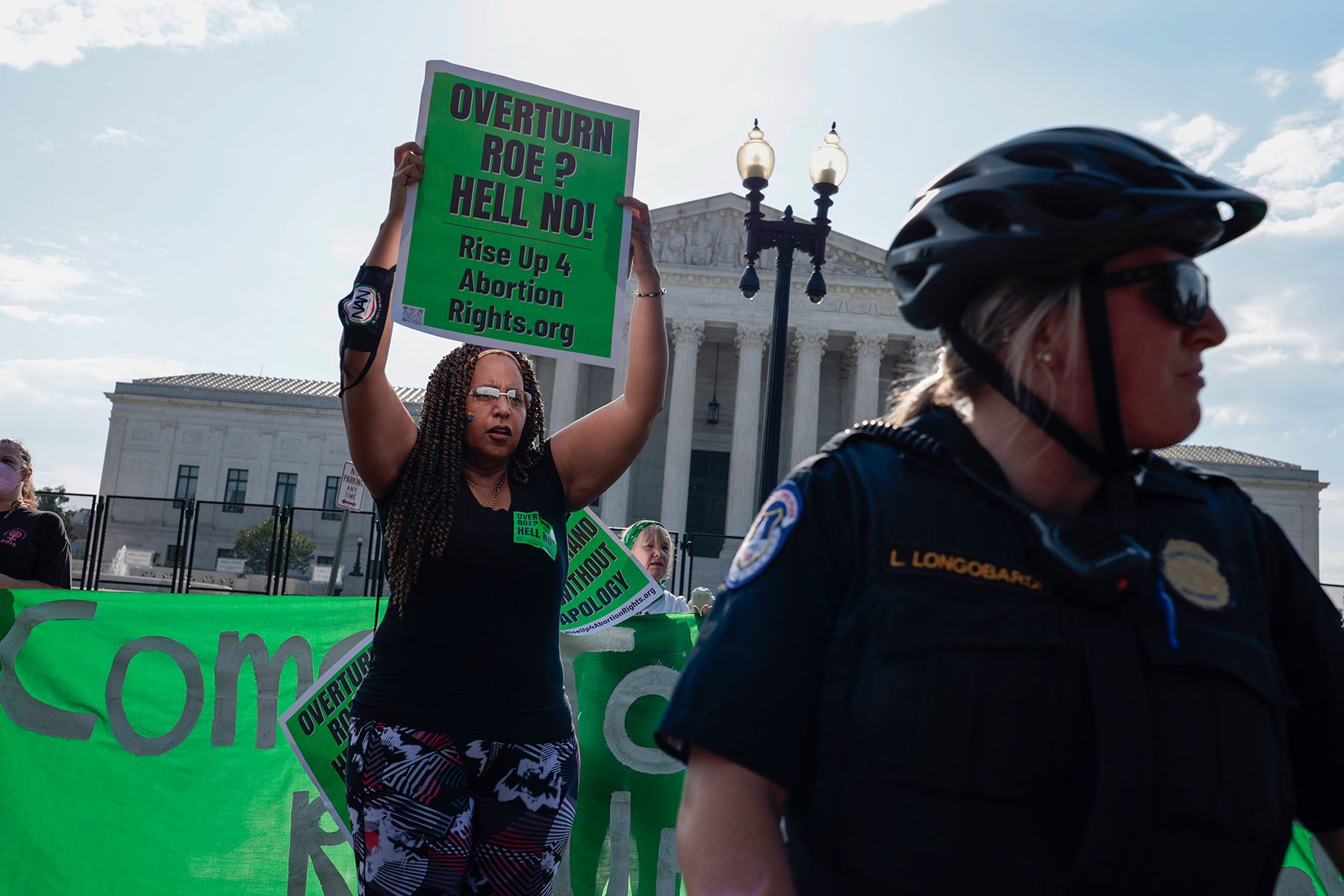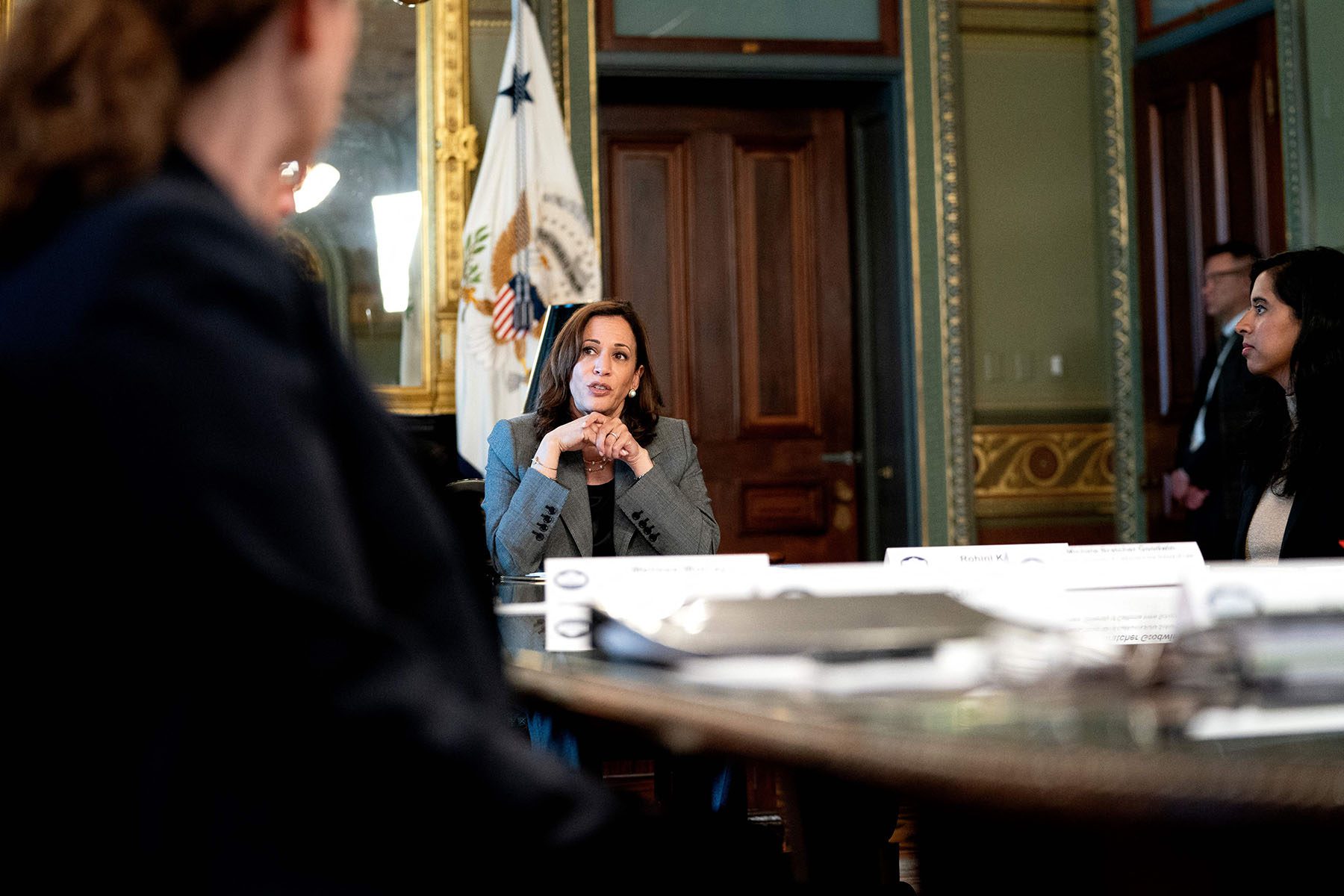
Tammy Duckworth (left) Elizabeth Warren and Maria Cantwell conduct a news conference outside the U.S. Capitol in support of reproductive rights in May 2022. TOM WILLIAMS/CQ-ROLL CALL/GETTY IMAGES
Medication Abortion and Clinics on Federal Land: Here Are Democrats’ Ideas to Protect Abortion Access
Facing a congressional stalemate, Democratic senators have asked the White House to consider a bevy of executive actions to protect abortion care ahead of an expected Supreme Court decision gutting Roe v. Wade.
A public health campaign. A new reproductive health ombudsman. Abortion clinics on federal land. These are just a few of the steps Senate Democrats want the White House to take if the Supreme Court, as expected, strikes down Roe v. Wade in the coming weeks — and there are signs that President Joe Biden is listening.
“We’ll fight the Republicans on the ground here, in the Senate, but the administration has its own tools,” Sen. Elizabeth Warren, a Democrat from Massachusetts, told The 19th during a conversation for its annual 19th Represents summit that starts Wednesday.
Warren, alongside Washington Democrat Patty Murray, sent a letter to Biden last week suggesting a host of executive actions the administration could pursue to protect abortion rights. A total of 25 Democrats — half their Senate ranks — signed the letter, which called on the president to direct federal agencies to “develop a national plan to defend Americans’ fundamental reproductive rights, including their right to an abortion.”
Some lawmakers say the administration is privately expressing more openness than before to leveraging its authority to protect abortion access. Sen. Tina Smith, a Minnesota Democrat who signed last week’s letter, told The 19th that the White House has been “very much” receptive to Democrats’ calls for executive action.
“Our letter to the president reflects additional conversations that I’ve had with colleagues in the White House about what executive actions they can take across the whole executive branch in response to this gutting of women’s reproductive freedom,” Smith said. “I know that they’re thinking about it — and they should think about it.”
The Supreme Court has yet to issue its decision in the case Dobbs v. Jackson Women’s Health Organization. But a draft opinion of the decision leaked May 2 suggested a five-justice majority was prepared to entirely overturn Roe v. Wade, the 1973 ruling that established a constitutional right to abortion care. A Dobbs decision gutting Roe would eliminate federal abortion protections and allow states to ban access to the procedure if they so choose.

Some states already have. Thirteen states have “trigger laws” on the books that would ban abortions once Roe is overturned. Others may enforce pre-Roe bans that were never repealed but have not been enforced. And still more have other abortion restrictions — laws banning the procedure at six weeks of pregnancy, for instance — that they could newly enforce.
Warren said that “we need to make Roe the law of the land” and while the Supreme Court “does not get the final word” on abortion rights, Democrats’ inability to get a bill onto Biden’s desk puts greater pressure on his administration to act. The Women’s Health Protection Act, federal legislation to enshrine abortion rights, failed not once but twice in the evenly split Senate after passing the House.
To that end, the senators suggested a host of potential actions the administration could take via federal agencies. Among those: educating the public about and expanding access to medication abortion, the two-pill reigmen that can be administered from home to terminate pregnancies within the first trimester; providing vouchers for people who will have to travel out of state for abortions once Roe is overturned; assessing whether abortions can be provided on federal lands, even in states that have restricted access; and using existing laws and regulations to limit cell phone applications’ ability to sell data that might reveal whether someone got an abortion.
Warren is preparing to introduce legislation related to data collection and abortion services this week, though it, too, will likely face united opposition from Republicans.
Even if successful, the approaches suggested by the senators would have limited impact, and they would almost certainly face legal challenges. But supporters of abortion rights have argued for months that, with an ongoing congressional stalemate, they still represent Washington Democrats’ best chance of influencing reproductive health policy.
“I don’t think any of those solutions necessarily are immune from challenge,” said Rachel Rebouche, the interim dean of Temple University’s Beasley School of Law and an expert in reproductive health law. “But even if they are going to ultimately fail it’s worth exploring what’s possible in ways that haven’t been done before.”
The senators’ letter reflects the reality that reproductive rights activists and doctors are increasingly pointing to self-managed abortion — people terminating pregnancies outside a medical facility — as the future of abortion care. The World Health Organization advises that abortions up to the 12th week of pregnancy can be safely managed at home with medication abortion pills so long as patients have access to appropriate information and support from health care professionals. (Other methods of self-managing may be ineffective or unsafe, and self-managing with pills still brings the risk of criminal prosecution.)
But new polling shared first with The 19th by the Center for American Progress (CAP), a left-leaning policy think tank, suggests that a public education effort like the one suggested by senators is needed about medication abortion. Only 46 percent of registered voters knew that it is possible to “safely and legally end a pregnancy at home with prescription medication.” An additional 37 percent were not sure, and 17 percent believed that it is not possible. Just 38 percent knew it was possible to safely manage an abortion via medication received by mail. An additional 44 percent were unaware this was an option, and 18 percent believed it was not possible.
The CAP survey was conducted online, with a sample of 2,000 registered voters. The poll has a margin of error of 2.2 percentage points.
When voters were asked whether they supported the right to safely end a pregnancy at home, support varied based on how the question was asked and political party. Republicans, for example, preferred the phrase “early abortion medication,” with 42 percent supporting such a procedure and 50 percent opposing it. Democrats showed the most support for the phrase “abortion pill,” with 74 percent supporting and 20 percent opposing it, but 68 percent also supported “early medication abortion.”
“Every single fact about early abortion medication tested in this survey improves the medication’s favorability,” the survey’s authors concluded, noting that the “biggest mover” is explaining its frequent use and long-term approval by Food and Drug Administration (FDA).
CAP’s polling also showed that bipartisan majorities oppose criminalizing medication abortion in states that have moved to restrict abortion access. Just 31 percent supported “charging women with a crime for using abortion medication in a state where it is illegal.” Only slightly more supported charging friends, family members or doctors for sending abortion medication out of state.
The White House has repeatedly said that it will not preview its plan to protect abortion rights ahead of the Dobbs decision. But there are signs that Biden, who has been reluctant to use the word “abortion” in discussing reproductive rights, is warming up to the idea of going on offense. In a June 7 appearance on “Jimmy Kimmel Live,” Biden said his office is looking at “some executive orders” he could deploy if Roe is struck down.

The public face of the White House’s effort to protection abortion care is often Vice President Kamala Harris, who Tuesday met with abortion law scholars who have researched various ways to expand access. Harris said the country “should prepare for the right to privacy to be attacked and under attack with this decision.” She also told participants she was worried that if Roe is overturned, it “could lead the way for challenges to other fundamental rights, including the right to contraception and same-sex marriage.”
Still, it’s not clear what specific actions Biden’s administration is considering.
“The Biden-Harris administration continues to explore every possible option in response [to] the anticipated Supreme Court decision in Dobbs, which would take away women’s rights, guaranteed for nearly 50 years under Roe v. Wade, to make their own choices about their reproductive health,” White House spokesperson Alexandra LaManna told The 19th.
Smith endorsed a strategy known as federal preemption. Under that framing, the FDA, a subsidiary of HHS that is authorized by Congress to regulate medication, could argue that, because it has already approved mifepristone, one of the two medication abortion pills, states cannot move to restrict access beyond what the federal government permits.
“State pharmacy boards can’t preempt the FDA when they say a vaccine is safe and effective, when they say a medication is safe and effective,” Smith said.
There is little case law to suggest whether a preemption argument would withstand legal scrutiny, noted Mary Ziegler, an abortion law historian who recently joined the law school at the University of California, Davis. That is similarly the case with other policy proposals Democrats are putting forth. Legal experts are divided on whether federally issued vouchers that help people pay for abortion-related travel would violate the so-called Hyde Amendment, which prohibits the use of federal funds to pay for abortions. It’s also unclear whether the administration could legally use federal lands to provide abortions in states that restrict access.

Another potential obstacle is that the Supreme Court could limit Biden’s options when it rules in a pending case concerning the breadth of the Environmental Protection Agency’s regulatory power. A ruling against the EPA, which is what many court observers expect, could curtail what federal agencies are legally allowed to do.
“The philosophy of the whole [Senate] letter is, ‘Let’s throw it at the wall and see what sticks,’” Ziegler said.
Policies with arguably the greatest chances of expanding abortion access — such as some relying on the interpretation and application of preemption — are the ones most likely to face legal scrutiny, she said.
“If it was possible for the federal government to operate abortion clinics on federal land, or basically pay the cost of travel to states that would perform abortions, and there was no pushbacks in the courts and that worked — that would have a big impact,” she said. “But it depends on the proposal.”
If new measures to protect abortion rights face legal challenges, it will be in a federal court that is increasingly hostile to protecting access, Rebouche said. Former President Donald Trump delivered on a decades-long push by Republicans and conservative groups to remake the federal judiciary by installing anti-abortion judges throughout the system, not just on the Supreme Court bench.
“As those conflicts get resolved — and some could take years — the Supreme Court could intervene,” Rebouche said.
Originally published by The 19th






